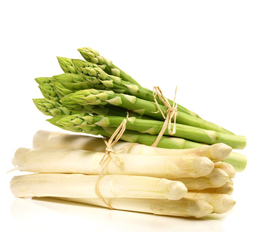Asparagus
Asparagus, asparagus is a genus of plants of the family obtained; known until 100 species, scattered around the world, mostly in dry climates. The most common type of asparagus Vulgaris. Some types of asparagus grass, others are shrubs, underground Rhizome and elevated more or less branched stems, many types of climbing. The upper part of the shoots of asparagus (about 20 cm) are used in cooking as a delicacy.
Asparagus comes from the Mediterranean region and is known to people since ancient times. Previously cultivated for medicinal purposes, as a diuretic and krovoochistitelnoe means (kalorizator). During the Renaissance the asparagus announced an aphrodisiac and so banned to use monks (a fact that calls the smile of modern man). In addition to outstanding nutritional qualities, asparagus is a decorative culture, which is used in floral arrangements (many familiar gentle «Christmas tree» with orange berries).
Calories: asparagus
Calories: asparagus is 20 kcal per 100 grams of product.
Composition of asparagus
Asparagus is a good source of dietary fiber, vitamins k, a, c, e and b complex, as well as folic acid, selenium, copper, manganese, potassium, calcium, iron and other essential minerals also asparagine, carotene and saponin. While asparagus contains very few calories.
Useful properties of asparagus
Asparagus is one of the most low-calorie vegetables, it nourishes not calories and minerals and vitamins. In addition, in many cultures, asparagus is considered curative plants.
Substances contained in asparagus, purify the blood, liver and a beneficial effect on the water (i.e. asparagus is an excellent diuretic).
Modern folk medicine uses broth roots and Rhizomes of plants with excessive palpitations, chronic circulatory insufficiency, difficult urination.
By the way, nowadays the asparagus is considered an excellent aphrodisiac. Thanks to asparagine asparagus has beneficial effects on the heart, kidneys, lowers blood pressure. The substances contained in it, working to remove the body of chloride, phosphate, and urea, which is very important for gout, urate Diathesis, acute and chronic nephritis, an inflammation of renal pelvis dilatation, bladder and urinary tract.
Asparagus in cooking
Asparagus only: do not prepare soups, garnishes, even desserts. But the real gourmands consume it exclusively fresh and whole.
Purchased or harvested asparagus is best eaten immediately, because the store worsens food quality vegetable (calorizator). If there is a need to store asparagus, then treat the sprouts need just like with flowers: update slices and place in a glass of water. The water should cover the base of the shoots on some centimetres. Glass should be covered with foil and refrigerate. This way you can keep fresh sprouts within a week.
Asparagus loses in nutritional value and, above all, in its marvelous taste. In case of emergency you can use to save method. Washed and clipped shoots need to pour boiling water on 3 minutes, then place in cold water for 5 minutes to stop the cooking process. Drain the water, packaged in bags for the freezer by removing from them the air sign packages and place in freezer.


Leave a Comment